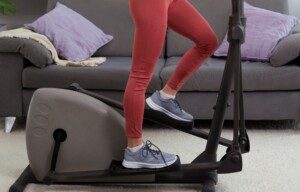
Here’s a neurologist’s explanation for what causes numb toes when you use the elliptical machine.
What a nuisance: One or more toes go numb whenever you pedal on the elliptical machine at the gym.
The numbness may have tingling and persist for a while after you get off the machine.
If you suffer from health anxiety, you may be apt to wonder if this means multiple sclerosis.
“This is not very scientific, although several factors probably play a role,” begins Bonnie Gerecke, MD, director of the Neurology Center at Mercy in Baltimore.
“When on the elliptical machine, there is more pressure placed on the toes and forefoot compared to the hindfoot,” she continues.
“There are small digital nerves in the toes that are likely being compressed when the feet are on the pedals, and this in part causes the toes to go numb.”
This does not mean anything is wrong with your nerves or muscles.
The mechanics of this are akin to wearing a tight pair of high heeled shoes, cramming in your toes; your toes will probably go numb pretty quickly.
Dr. Gerecke continues, “There is also increased swelling in the feet during exercise, and this can also cause numbness. Tight fitting shoes are probably also contributory.”
How to Prevent Toes from Going Numb on the Elliptical Machine

Freepik
“One can wear slightly larger shoes than normal, although too much room could cause blistering,” says Dr. Gerecke.
“Pedaling backward intermittently for brief spurts can also help. Alternating with other exercises is also helpful.”
In addition, place your feet a bit away from the edge of the pedaling platform so that the toes don’t jam up against it when you pedal.
“While experiencing toe numbness while using the elliptical is common, if there is prolonged or severe numbness or tingling, one should seek the attention of a health care provider for an evaluation.”

Dr. Gerecke has a special interest in ALS, myasthenia gravis, myopathy/muscular dystrophy, peripheral neuropathy and radiculopathy. She is board certified in general neurology and neuromuscular medicine.
 Lorra Garrick has been covering medical, fitness and cybersecurity topics for many years, having written thousands of articles for print magazines and websites, including as a ghostwriter. She’s also a former ACE-certified personal trainer.
Lorra Garrick has been covering medical, fitness and cybersecurity topics for many years, having written thousands of articles for print magazines and websites, including as a ghostwriter. She’s also a former ACE-certified personal trainer.
.

























